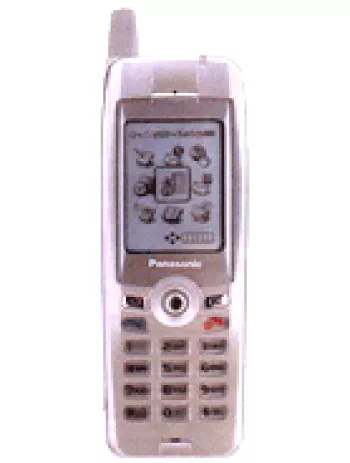
Introduction to Panasonic GD95
The Panasonic GD95 was a remarkable feature phone released in the early 2000s, a period when mobile technology was undergoing significant transformations. Launched in 2001, this device stood out due to its sleek design, user-friendly interface, and reliable basic functionalities. It was part of the competitive race among mobile manufacturers to produce efficient and stylish phones to cater to the growing demand for mobile communication.
Design and Build
The Panasonic GD95 had a distinctive and compact design, measuring 120 x 45 x 14 mm and weighing only 85 grams. Its dimensions and lightweight structure made it a portable device that fit comfortably in the user's hand or pocket. Despite lacking the vibrant color displays of modern smartphones, its monochrome graphic screen could display 11 lines and 16 characters, which was quite adequate at the time.
Constructed with durable plastic and equipped with a Mini-SIM slot, the GD95 had a solid build quality. It was available in two color variants, offering users some level of personalization in an era when color options were limited.
Display
The display of the GD95 featured a simple monochrome graphic interface. Although it did not support color, its clarity and readability were sufficient for text-based communications such as SMS and navigating through menu options. The simplicity of the display contributed to a longer battery life, a crucial consideration in phones of that era.
Network Capabilities
In terms of network capabilities, the GD95 supported GSM technology, operating on 900/1800 MHz bands. This ensured decent coverage and call quality across different geographical regions. Unlike today's ubiquitous 3G and 4G connectivity, its network capabilities were limited to 2G, with GPRS available in the GD96 model only. There was no support for EDGE or advanced mobile internet features, reflecting the primary focus on voice calls and SMS.
Battery Life
The GD95 was powered by a removable 690 mAh Li-Ion battery. According to specifications, the standby time could last up to 90 hours, while the talk time could extend up to 5 hours. These figures were quite satisfactory for day-to-day use, as the device's power consumption was minimal compared to modern smartphones. The removable nature of the battery also meant users could carry spares if needed, a convenience that has become less common in current smartphone designs.
Memory and Storage
With an internal phonebook capable of storing up to 200 contacts, the GD95 was well-equipped for the average user’s contact management needs. However, it lacked expandable storage and a card slot, which was typical for phones from this generation. Call logs were relatively basic, keeping records for 10 dialed, received, and missed calls each, illustrating the essential nature of phone functionalities during this period.
Sound and Alert Features
Audio functionalities on the Panasonic GD95 included monophonic ringtones and a vibration alert function. While it did not have a loudspeaker or a 3.5mm headphone jack, users appreciated the vibration alert, which ensured they didn’t miss calls or messages in noisy environments. These features were consistent with the device's focus on fundamental communication needs rather than entertainment.
Communication and Connectivity
Certain limitations were evident in the GD95's connectivity options, as it did not support Bluetooth, WLAN, or radio functionalities, which are standard in modern devices. As a device primarily for communication, its features emphasized SMS and email messaging, complemented by a WAP 1.2 browser for basic internet browsing.
Additional Features
Despite its limitations, the GD95 included a number of additional features for user convenience. It had a clock and alarm function, permitting simple time management. For entertainment, the phone came pre-installed with two games, offering a modest option for leisure. The absence of Java support did limit the potential for additional applications or games, which would have been a consideration for some users.
Conclusion
The Panasonic GD95 represents an interesting chapter in the history of mobile telecommunications. Its focus on basic communication features, coupled with a sleek design and ergonomic form, captured the essence of early 2000s mobile technology. While lacking many qualities of modern smartphones, its functionality and reliability made it a practical choice for users at the time. The GD95 serves as a poignant reminder of how far mobile technology has progressed, highlighting the evolution of user needs and technological capabilities.
Key Features of Panasonic GD95
- Compact Design: With dimensions of 120 x 45 x 14 mm and a weight of just 85 g, it is lightweight and easy to carry.
- GSM Technology: Supports GSM 900 / 1800 networks.
- Monochrome Graphic Display: Simple display with 11 lines x 16 characters.
- Ample Phonebook: Can store up to 200 contacts.
- Messaging Capabilities: Supports SMS and Email.
- WAP 1.2 Browser: Basic internet browsing capability.
- Battery Life: Removable Li-Ion 690 mAh battery providing up to 90 hours of standby time and up to 5 hours of talk time.
- Games: Pre-installed with 2 games for entertainment.
- Alert Types: Offers vibration and monophonic ringtones with a composer for personalization.
Panasonic GD95 Drawbacks
- Lack of advanced network support: No support for EDGE or 3G/4G technologies.
- Monochrome display with limited resolution, offering basic visual experience only.
- No memory card slot for expandable storage options.
- Primitive sound capabilities: No loudspeaker or 3.5mm headphone jack.
- Absence of modern connectivity options like WLAN, Bluetooth, or USB.
- No built-in camera, which is standard in more modern devices.
- Minimal entertainment options with only two games and no Java support.
- Limited battery performance with maximum 90 hours of standby time.
- Lacks modern sensors and advanced features found in later models.
View Also
More Phones
All Rights Reserved +14266 Phones © Mobilawy 2025
























